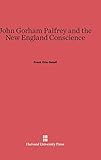John Gorham Palfrey and the New England Conscience / Frank Otto Gatell.
Material type: TextPublisher: Cambridge, MA : Harvard University Press, [2013]Copyright date: ©1963Edition: Reprint 2014Description: 1 online resource (337 p.)Content type:
TextPublisher: Cambridge, MA : Harvard University Press, [2013]Copyright date: ©1963Edition: Reprint 2014Description: 1 online resource (337 p.)Content type: - 9780674281592
- 9780674281608
- 923.273
- E340.P2 .G384 1963
- online - DeGruyter
| Item type | Current library | Call number | URL | Status | Notes | Barcode | |
|---|---|---|---|---|---|---|---|
 eBook
eBook
|
Biblioteca "Angelicum" Pont. Univ. S.Tommaso d'Aquino Nuvola online | online - DeGruyter (Browse shelf(Opens below)) | Online access | Not for loan (Accesso limitato) | Accesso per gli utenti autorizzati / Access for authorized users | (dgr)9780674281608 |
Frontmatter -- Preface -- Contents -- Illustrations -- I The Child -- II The Student -- III Liberal Theology -- IV Brattle Street -- V Dean Palfrey -- VI The North American -- VII The State House -- VIII A Practicing Abolitionist -- IX Conscience and Judgment -- X “He Knows Nothing About Politicks” -- XI Down with Old Zack -- XII Trial by Stalemate -- XIII Defeat -- XIV Political Twilight and the Puritan Past -- XV War Against the Slave Power -- XVI The Celebrated New Englander -- Manuscript Collections Cited. Palfrey's Books and Pamphlets. Notes. Index -- Manuscript Collections Cited -- Palfrey's Books and Pamphlets -- Notes -- Index
restricted access online access with authorization star
http://purl.org/coar/access_right/c_16ec
The New England of his day regarded John Gorham Palfrey's life as blameless and exemplary, a nineteenth-century "monument to the Puritan ideal of rectitude." Yet he himself once called it "his personal tragicomedy." At least, it was diverse, for Palfrey had been historian, Harvard educator, Unitarian minister, Massachusetts politician, editor of the North American Review, and crusader against slavery, and himself an emancipator. During his lifetime, from 1796 to 1881, Palfrey participated, sometimes reluctantly, in revolutionary changes in the political, economic, and intellectual climate of New England. In his stormy political career, Palfrey not only was Massachusetts Secretary of State, member of Congress, and Postmaster of Boston, but also played a key role in the formation of the Free Soil Party. When the Whigs, in the name of national unity and compromise, seemed to ignore the moral necessities of the slavery question, he joined with such men as Charles Francis Adams, Charles Sumner and Richard Henry Dana, Jr., to reaffirm traditional moral values. From this struggle, Palfrey emerged a political loser. Hampered by inflexibility, he later retreated to his study to write his massive history of New England, nursing his disappointment and cherishing his sense of rectitude. We are left with the image of a man whose achievements were substantial, perhaps because he insisted upon making his life a Bay State morality play. For this biography of Palfrey, Gatell has used papers of Palfrey's contemporaries and of the Palfrey family manuscripts, among them an unpublished autobiography, itself a search for meaning in a long and perplexing life.
Mode of access: Internet via World Wide Web.
In English.
Description based on online resource; title from PDF title page (publisher's Web site, viewed 24. Aug 2021)


